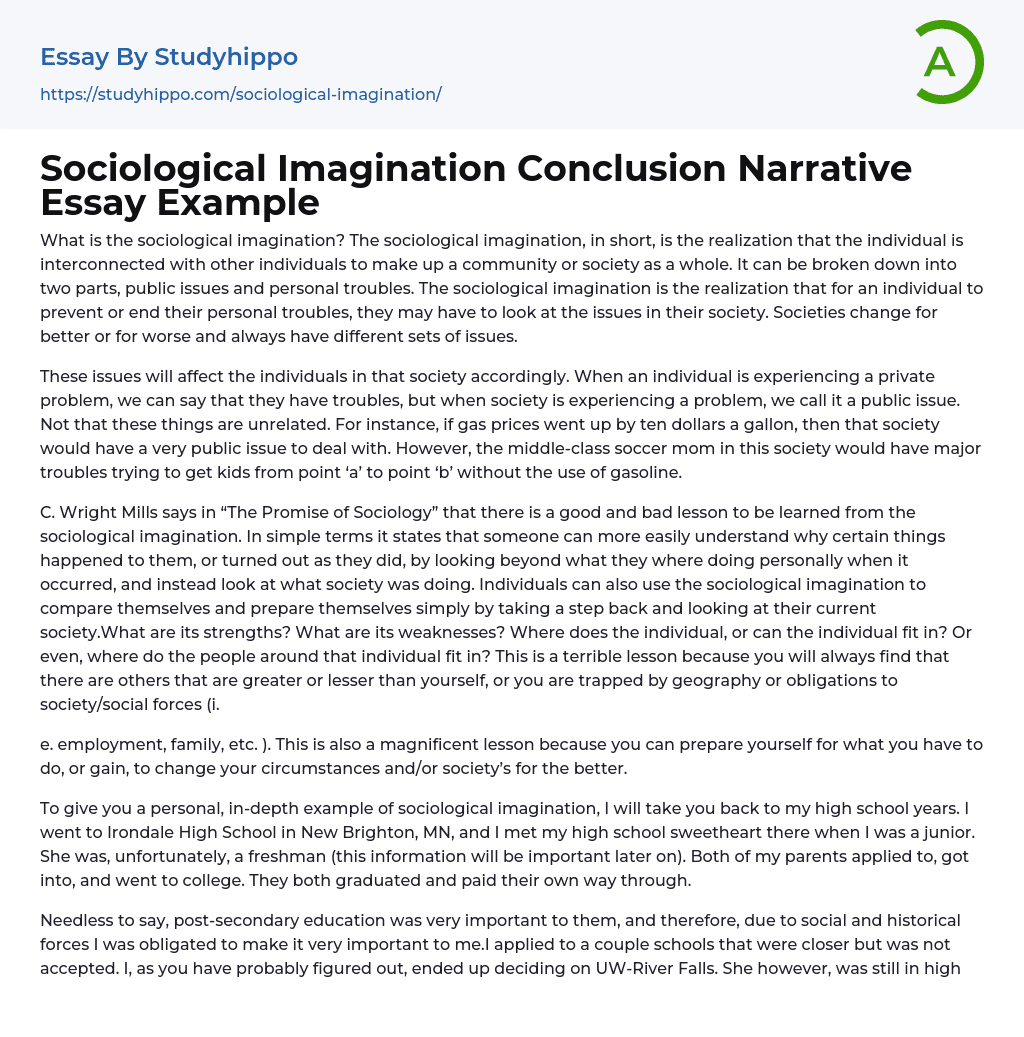

Sociological Imagination Conclusion Narrative Essay Example
What is the sociological imagination? The sociological imagination, in short, is the realization that the individual is interconnected with other individuals to make up a community or society as a whole. It can be broken down into two parts, public issues and personal troubles. The sociological imagination is the realization that for an individual to prevent or end their personal troubles, they may have to look at the issues in their society. Societies change for better or for worse and always have different sets of issues.
These issues will affect the individuals in that society accordingly. When an individual is experiencing a private problem, we can say that they have troubles, but when society is experiencing a problem, we call it a public issue. Not that these things are unrelated. For instance, if gas prices went
...up by ten dollars a gallon, then that society would have a very public issue to deal with. However, the middle-class soccer mom in this society would have major troubles trying to get kids from point ‘a’ to point ‘b’ without the use of gasoline.
C. Wright Mills says in “The Promise of Sociology” that there is a good and bad lesson to be learned from the sociological imagination. In simple terms it states that someone can more easily understand why certain things happened to them, or turned out as they did, by looking beyond what they where doing personally when it occurred, and instead look at what society was doing. Individuals can also use the sociological imagination to compare themselves and prepare themselves simply by taking a step back and looking at their current society.What are its strengths? What are
its weaknesses? Where does the individual, or can the individual fit in? Or even, where do the people around that individual fit in? This is a terrible lesson because you will always find that there are others that are greater or lesser than yourself, or you are trapped by geography or obligations to society/social forces (i.
e. employment, family, etc. ). This is also a magnificent lesson because you can prepare yourself for what you have to do, or gain, to change your circumstances and/or society’s for the better.
To give you a personal, in-depth example of sociological imagination, I will take you back to my high school years. I went to Irondale High School in New Brighton, MN, and I met my high school sweetheart there when I was a junior. She was, unfortunately, a freshman (this information will be important later on). Both of my parents applied to, got into, and went to college. They both graduated and paid their own way through.
Needless to say, post-secondary education was very important to them, and therefore, due to social and historical forces I was obligated to make it very important to me.I applied to a couple schools that were closer but was not accepted. I, as you have probably figured out, ended up deciding on UW-River Falls. She however, was still in high school for two more years. At that time I didn’t own my own car and relied on my parents or friends to get around. I would consider this a personal trouble.
After graduation and the following summer I finally had to move away. My sweetheart and I couldn’t see each other nearly
as often and our relationship slowly died out as the year wore on. We broke up and eventually moved on.Its been a long time now, but what if I hadn’t gone to school? What if I had been accepted at The University of Minnesota or another school closer to home? After learning about the sociological imagination, I now see that I could be in a different place with a different job, had I been exposed to a different set of social and historical forces.
I have also realized how much of an impact these forces can have on an individual’s entire life. I learned that every individual plays a part in his/her society, which is magnificent, but the opposite is also true, which can be terrible.
- Culture essays
- Social Control essays
- Citizenship essays
- Social Justice essays
- Caste System essays
- Social Responsibility essays
- Socialization essays
- Deviance essays
- Modern Society essays
- Popularity essays
- Civil Society essays
- Community essays
- Female essays
- Filipino People essays
- Igbo People essays
- Indigenous Australians essays
- Indigenous Peoples essays
- Minority Group essays
- Social Institution essays
- Men essays
- The nation essays
- Middle Class essays
- Social Norms essays
- Discourse Community essays
- Popular Culture essays
- Car Culture essays
- American Culture essays
- Mormon essays
- Indian Culture essays
- Mexican Culture essays
- Pop Culture essays
- Cultural Differences essays
- Culture Shock essays
- Different Cultures essays
- Anthropology essays
- Audience essays
- Charity essays
- Cultural Competence essays
- Emile Durkheim essays
- Gender Roles essays
- Generation essays
- Globalization essays
- Interpersonal Relationship essays
- People essays
- Race essays
- Social Change essays
- Social Class essays
- Social Movement essays
- Social Science essays
- Social Status essays



